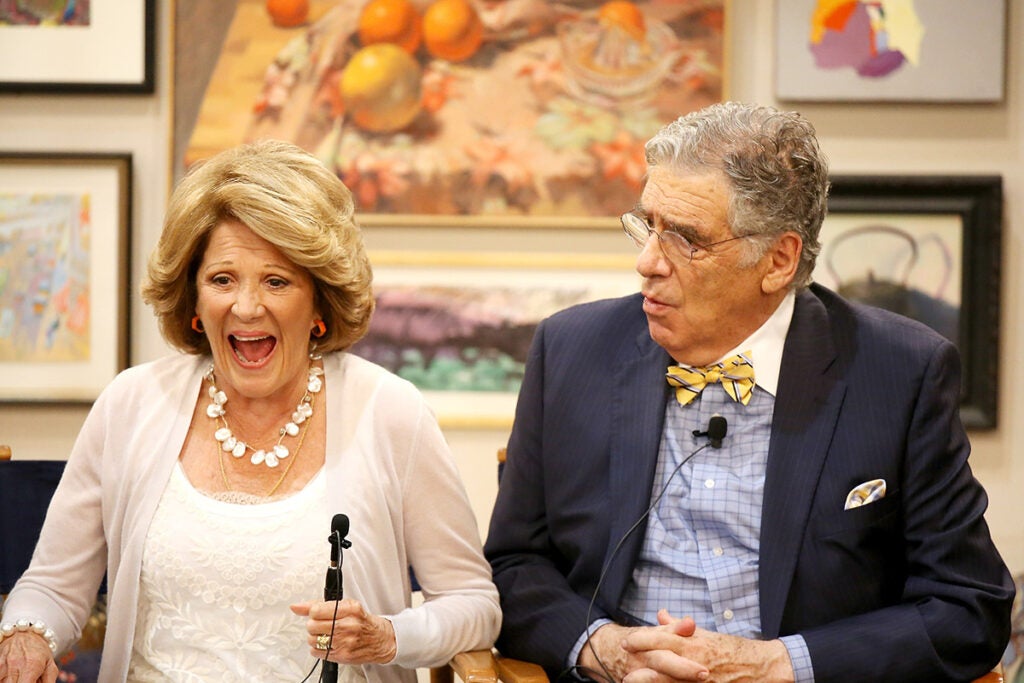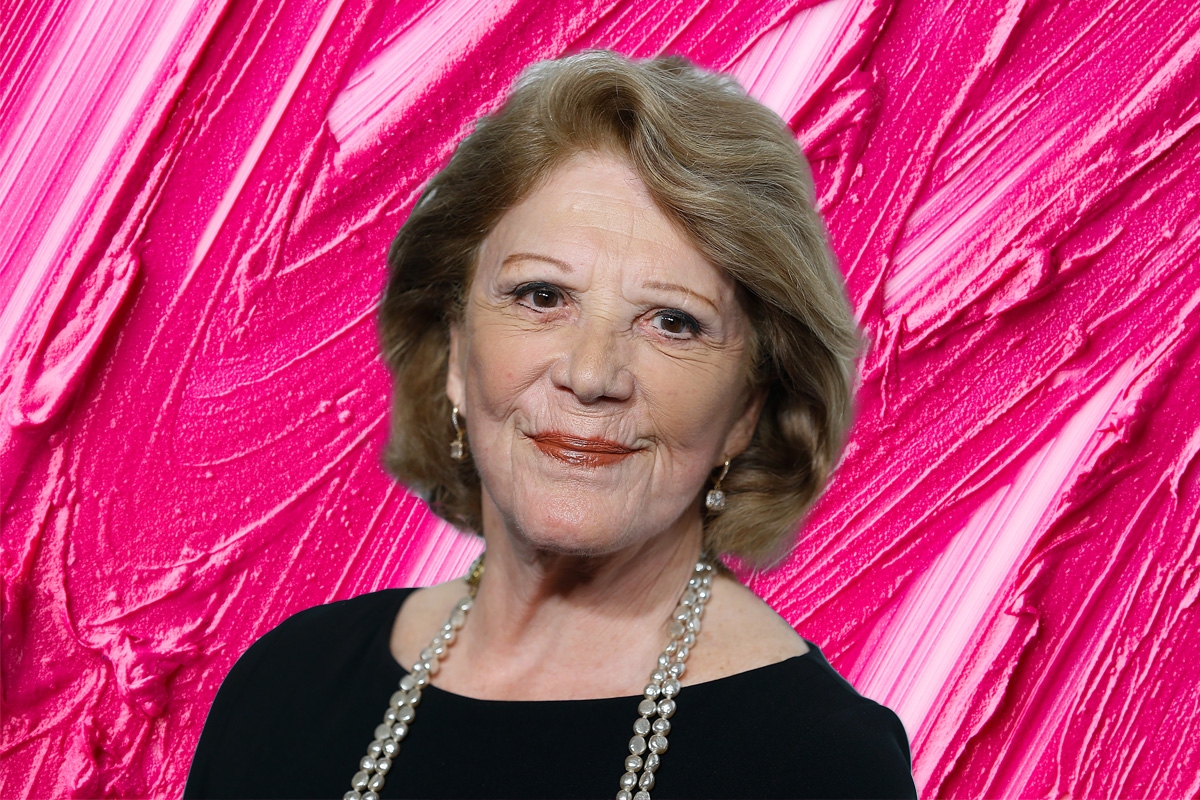“Early to rise, early to bed,” Linda Lavin, who passed away last December at age 87, sang in the iconic opening tune of her hit show “Alice.” The theme song was co-written by Jewish duo Alan and Marylin Bergman, capturing a reality of working moms that remains as real now as it was in 1976 when the show first came out: “In and between I cooked and cleaned and went out of my head.”
Decades before Reba McEntire would sing about being a “single mom who works two jobs,” there was Linda Lavin, a Jewish woman in her early 40s, a Broadway star, making working single moms feel seen across the country. She played the titular Alice Hyatt, based on the 1974 movie “Alice Doesn’t Live Here Anymore,” an aspiring singer with dry wit and humor who gets stranded in Phoenix with her son when her car breaks down and ends up working as a waitress in a diner while donning that signature pink uniform.
Linda Lavin’s Alice, a role that earned her two Golden Globes and an Emmy nomination, wasn’t just a tough-as-nails inspiration to women, she was also a source of fantasy for latchkey kids who wanted Alice to be their mother. Because as amazing as she was as a working mom, one who staged a strike when she found out that Mel, her boss, paid his new male server more than her, one who asked for a raise plainly, she was also a great, attentive parent to her son, Tommy, played by Philip McKeon.
It was Lavin’s own Jewish mother who inspired her to sing. Lucille Potter Lavin was an opera singer who sang for the radio with the likes of George Gershwin. She raised her daughter in 1930s and ’40s New England, a time when women mostly didn’t continue their careers when they had children. Lucille stopped singing professionally when she got pregnant with Linda, but she encouraged her daughter to sing and play piano, often to entertain her friends. “I thought getting attention was the same thing as getting love,” Linda once said. Her first gig in New York, long before she became a Broadway legend, was at a bar mitzvah at the Pierre ballroom. She was 12 years old, wearing a pink dress on stage in front of 500 people where she sang “So In Love” from “Kiss Me, Kate.”
“I finished the song and as I descended the stage on the way back to my table,” Lavin recalled in a piece in the New York Times, “a small woman came toward me on the dance floor with her arms open wide: my mother. She wrapped her arms around me in such pride, such pleasure, such joy. I was overwhelmed. I was embarrassed. I was 12. But today, I am so grateful and full of love for her.”
Linda never stopped singing. Not on the Broadway stage, where she won a Tony and three Drama Desk Awards for her roles in plays and musicals. Not during the pandemic, when she held daily concerts in her Manhattan apartment, bellowing beautiful classics in her virtual matinees. Not when she was excluded from a Sondheim tribute concert for his 90th birthday and commented on a Deadline article about the show, suggesting she could sing “The Boy From..,” a parody song she originated in the Sondheim off-Broadway play “The Mad Show” based on the story of Mad Magazine. Lavin got a call from the producers of the show, who then asked her to do just that. “Sometimes people don’t think of you, they don’t know you’re here… you’ve gotta let them know,” she recalled in an interview about the incident.
Linda Lavin always had the chutzpah to let people know she was there.
Many of Lavin’s iconic roles were of larger-than-life Jewish mothers and Jewish women — complicated women who could be abrasive and brash while also soft and sensitive, always magnetic. She played Mrs. Van Daan in “The Diary of Anne Frank.” She played Jewish teacher and writer Ruth Steiner in Donald Marguiles’ “Collected Stories.” She was Jewish housewife Marjorie Taub in “The Tale of the Allergist’s Wife,” a role that earned her many an award nomination. She starred in Wendy Wasserstein’s “Sisters Rosensweig” and played the Jewish Rita Lyons in the Nicky Silver play “The Lyons.”
Lavin worked on multiple Neil Simon plays and won a Tony for the role of Kate Jerome in “Broadway Bound.” A reviewer in the New York Times lauded her role as “a remarkable achievement — a Jewish mother who redefines the genre even as she gets the requisite laughs while fretting over her children’s health or an unattended pot roast.”
Lavin seemed content to keep playing these Jewish roles. The granddaughter of four Jewish immigrants from Eastern Europe who grew up in an actively Jewish family in Portland, Maine, she once shared, “I live on a daily basis as a Jew. I’m all about comfort and belonging.” In the early 2000s, she even traveled to see where her grandparents came from.
“It was powerful,” she recalled in a 2005 interview. “[The Germans] killed 94 percent of the Jewish population. I was reeling with the connection to my foremothers and forefathers. If not for their courage in getting out, they wouldn’t have survived.”
After “Alice,” Lapin went on to play more iconic TV mothers. Fans might know her as the Jewish grandmother of Adam Brody’s Seth in “The O.C.” She played Ruth Liebman in the World War II TV movie “The Ring.” In the short-lived comedy “9JKL,” she played Elliott Gould’s wife. In the show “B-Positive,” she played Norma Goldman. Her two final roles, which will premiere posthumously, are mothers, too. She starred in “One Big Happy Family,” starring, written and produced by Lisa Brenner, which is inspired by Brenner’s life. In the movie, Brenner, who plays a mother preparing for her child’s bar mitzvah, and Lavin, who plays her high-strung mother, go on an unexpected journey of “shock, dismay, disillusionment and self-discovery.”

Linda Lavin and Elliott Gould of ‘9JKL’ speak onstage during the 2017 Summer TCA Tour. (Photo by Michael Tran/FilmMagic)
In an upcoming Hulu show, “Mid-Century Modern,” Lavin plays Sybil Schneiderman, Nathan Lane’s character’s Jewish mom who is “wise, caring, and iconoclastic,” according to a release.
Lavin used her platform to talk about issues she cared about. She dressed up in that pink waitress uniform of Alice’s to talk in support of the ERA in Washington. In the 1990s, she went on her good friend Joan Rivers’ talk show (“Joan used to take me around to all her agents and she used to say, this girl is good”) to talk not about her latest role, but about her divorce with her second husband and the emotional abuse she endured in that marriage. Lavin and her divorce lawyer didn’t mention the name of her ex-husband, but she talked about her “invisible” scars. She also spoke openly about a miscarriage she went through, a tragedy that indelibly changed her, and how her husband chose not to be at her side. In the guest appearance, Lavin was incredibly open and vulnerable while projecting so much power; she was there on a mission: to make others like her be able to see what they were going through, and to remind people that if someone treats them that way, it is possible to fight them in court. It’s a classy, awe-inspiring thing to watch to this day.
Lavin was married three times. She was married to Jewish actor Ron Leibman for over a decade. (Leibman, who passed away in 2019, married actress Jessica Walters after their divorce.) Her second marriage, to Kip Niven, led to that contentious divorce but also gave her two step-children, Kate Morse and Jim Niven, by whom she is survived. Over two decades after that painful separation, Lavin thought she was done with love, forever unlucky in romance. But then she met actor, musician and painter Steve Bakunas, 20 years her junior, and they spent over two decades in love. Her final words to him when he drove her to the hospital, a mere minutes before she passed away, were, according to Bankunas, “Honey, if I die, know that I love you so much.”
The last time I saw Linda Lavin on screen was in “No Good Deed,” the hit TV thriller from Jewish TV creator Liz Feldman. Lavin played Phyllis Adelman (who is definitely Jewish), a nosy, chutzpah-filled neighbor who also manages to look fabulous in pink sweatsuits, with painted bright red nails and done-up hair. Phyllis is a true menace, and every minute of Lavin on-screen is an utter delight.
Watching Lavin, off and on the screen and stage, has taught me so much — about womanhood, love, self-esteem, second chances and putting yourself forward. To heed the words of that famous Alice opening song, she taught so many to “get out and start enjoying cause life’s too short.” Lavin became a TV icon at the tail end of her 40s, and in her late 80s, she was still in the prime of her career, continuing to find new ways to do the things that she loved.
“Oh sweet, brilliant, talented, beautiful [Linda Lavin],” Feldman wrote on her Instagram after her passing. “Getting to work with you once was an honor and a joy. I loved writing for you on 9JKL all those years ago. I just loved YOU. Being around you. In your magnetic orbit. That we got to collaborate again on No Good Deed was simply a gift. You were, as always, incredibly gracious, totally hilarious and pitch perfect. Ready to play and full of life. Your warmth and kindness was unparalleled. I just loved you. We all did. I’m so glad I got to see you a few weeks ago at the premiere and introduce you to my parents. They were thrilled to meet you. And my father made it very clear to me that you were his favorite part of No Good Deed. He wasn’t the only one who felt that way. Thank you for letting me into your stunning orbit. And for allowing me to spin with you for a while.”
What a voice, what a life, what a legacy. Linda Lavin’s memory is most certainly a blessing.








